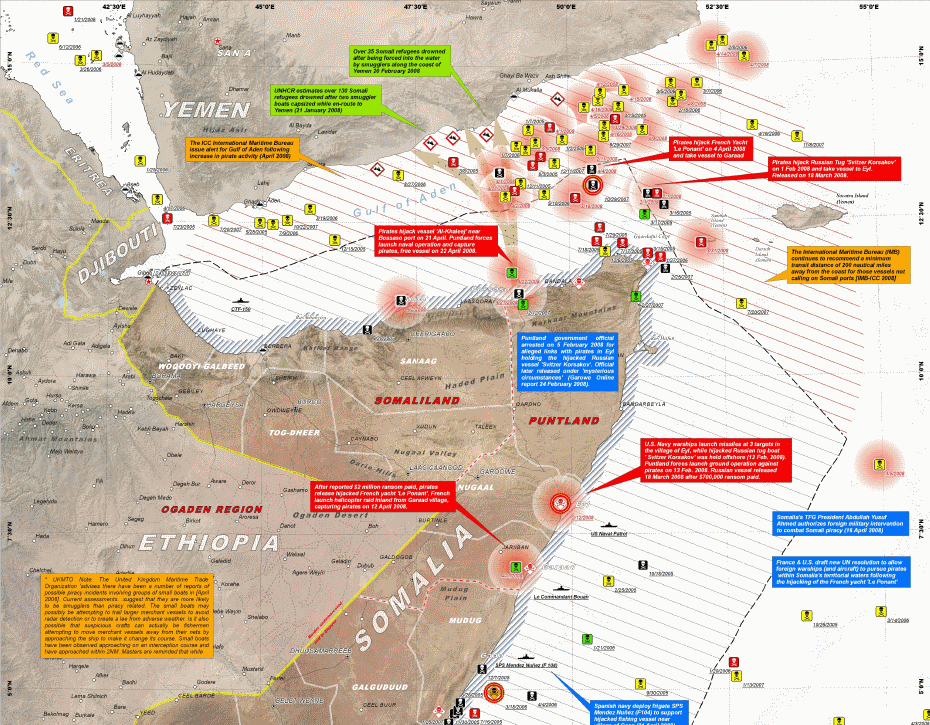This (geo)graphic accounting of Somali piracy, provided by UNOSAT.
Today’s Washington Post article (entitled “The Guns of Anarchy”) by Mark Bowden, the author of “Black Hawk Down,” had a great quote that I felt captured the essence of the sources piracy spanning the Red Sea, the Gulf of Aden and the Indian Ocean, along the coasts of Somalia, Djibouti, Eritrea, and Yemen. His article focused on the persistent state failure that has characterized Somalia for the past 20 years. Rather than actually addressing this state failure in a coordinated fashion with the panoply of soft power necessary to succeed, he noted that the “European Union and the United States have begun to chase pirates more aggressively, but that’s like swatting at bees while ignoring the hive”.
Indeed! Mainstream broadcast and print journalists have almost completely ignored the “hive”, but have been very taken with “PIRATES!”. (Personally, I suspect it has something to do with Keira Knightley). It is clearly no fun covering the mess that is Mogadishu (or the rest of the country for that matter), but I fear that there is actually no institutional capacity anywhere committed to thinking through the steps that must be taken in order to overhaul failed states such as Somalia. As Bowden points out, this piracy is “nothing more than the general criminal chaos spilled from land to sea — ply the waters off Somalia’s thousand-mile coastline, so threatening international shipping that they have driven up the price of food and other products throughout the region”.
It would be interesting to see a calculation of the costs that this failed state to the world. Typically, failed states only result in things like human suffering, death and dismemberment, contagious disease, and environmental degradation – things we are generally uncomfortable placing a dollar cost on. I know that we don’t like asking ourselves whether saving 100,000 lives is worth $1B in engagement – what should saving lives cost? But, in this case, we can actually run a financial tally of what ignoring people’s well being will cost – the ship manifests lost to the Somali pirates – and we generate a concrete cost for our unwillingness to overhaul and right this failed state.
*****
Update: I was emailing yesterday with one of my buddies finishing up a tour in Djibouti, in the newly established AFRICOM. In his email, he made a comment that I sought clarification on. His response:
“I meant to pay an off-handed compliment to the pirates for having the kahuna’s to take down large tankers three to four hundred or so miles off their coast. Believe they raked in about $50 million in ransom money last year, life is good in Eyl…
…Dr. Ken Menkhaus from Davidson college came through here and has a pretty good perspective on where things in Somalia stand, which is the worst he’s ever seen it since he started coming to Somalia back in the 80’s, http://middleeastdesk.org/article.php?id=2650. We get calls from ships and yachts that are transiting through the Gulf of Aden asking us for help, unfortunately there’s not much we can do since we (AFRICOM) don’t have any assets. It sounds like between the EU, UN, and even the CHICOMS, that the piracy business is getting a lot more attention. The French mirages taking off from the runway we live next to has been a lot noisier lately.”
****
More Update from Friend in Djibouti:
“Both Kenya and Yemen have a vital interest in Somalia, they’re scared to death of a mass migration, which would overwhelm their fragile governments. We run what’s known as a COL camp on a Kenyan naval base in Lamu, Manda Bay. An article by Tom Barnett that came out in Esquire magazine a year or so ago is pretty much spot on www.esquire.com/features/africacommand0707-6.
Somalian refugees are routinely thrown overboard a mile or so off the Yemen coastline once the smugglers have been discovered. The USG strikes that occur against al shabaab in Somalia seem to stir the hornet’s nest. Recent suicide attacks in Somaliland and Puntland were troubling since those are considered fairly stable and autonomous regions by Somalia standards. Mogadishu use to have the best italian restaurants in africa, and surprisingly, you would find better cell phone coverage there then you would in some US cities. Bottom line, nothing starts improving in Somalia until the proxy war between Ethiopia and Eritrea is settled and they agree to some sort of compromise on their border dispute. Ethiopian troops pull out of Mogadishu, happening now, and a real UN force (highly unlikely) supplants the token African Union (AU) force that’s there now, basically 2,000 Ugandans and Burandi’s hunkered down at the Mogadishu airport. The estimated number of troops the AU pledged to send was around 9,000, isn’t going to happen, they couldn’t pull it off.
M. Rice, the incoming ambassador to the UN, used to the undersecretary of State for African affairs. Hopefully, her efforts will lead to a more stable horn, i.e, an air blockade of Darfur (which the chinese will block at the UN), and a stepped up diplomatic effort with the Eritrean and the Ethiopian border dispute which won’t be easy since Issais kicked out and got rid of everything western including UNMEE, Luftansa, and the Movenpick hotel in Asmarra. I have a friend that’s in Djibouti because she can’t live in Eritrea after she worked for UNMEE and was detained because she was at a bar-b-q with her UNMEE co-workers.
As recent as this summer, Djibouti hosted peace talks between the Somalia TFG and a few of the more moderate factions of islamic warlords that control Mogadishu. They have good intentions, but without any real power, no one’s confident they mean much other then token good will.”
